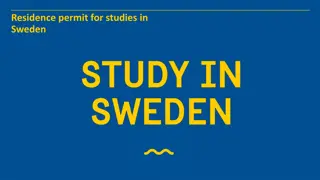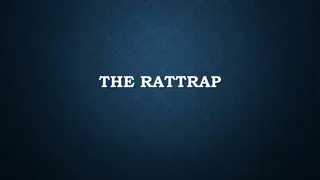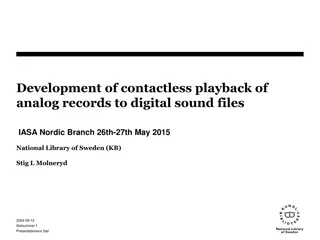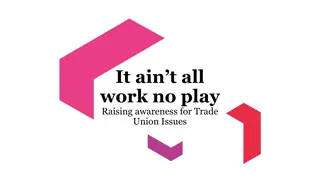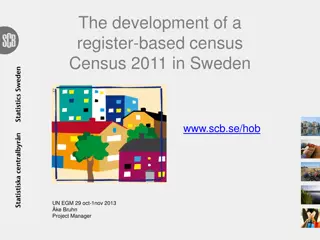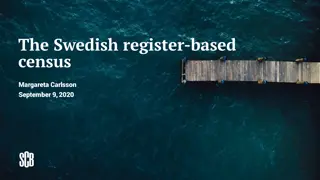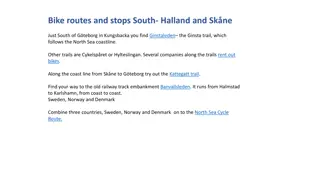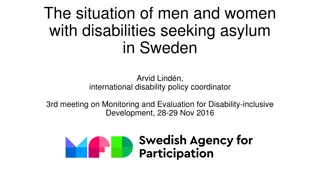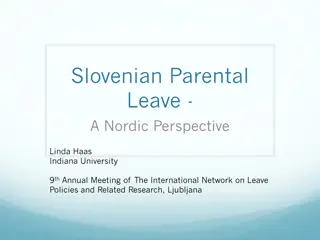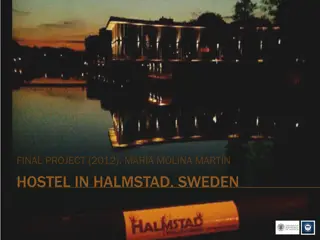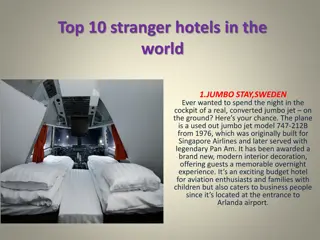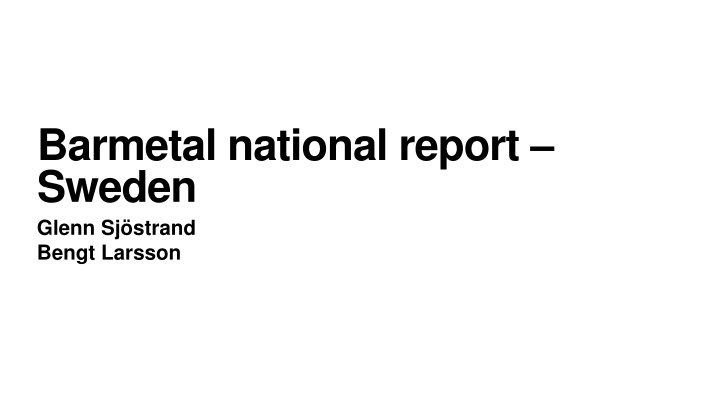
Swedish Labour Market and Industrial Relations Report
Explore the Swedish labour market and industrial relations landscape, highlighting the role of unions, collective agreements, and challenges posed by digitalization and automation. Get insights into national policies and social dialogue shaping the sector, along with company profiles reflecting the current trends and perspectives in the industry.
Download Presentation

Please find below an Image/Link to download the presentation.
The content on the website is provided AS IS for your information and personal use only. It may not be sold, licensed, or shared on other websites without obtaining consent from the author. If you encounter any issues during the download, it is possible that the publisher has removed the file from their server.
You are allowed to download the files provided on this website for personal or commercial use, subject to the condition that they are used lawfully. All files are the property of their respective owners.
The content on the website is provided AS IS for your information and personal use only. It may not be sold, licensed, or shared on other websites without obtaining consent from the author.
E N D
Presentation Transcript
Barmetal national report Sweden Glenn Sj strand Bengt Larsson
Swedish Labour market &industrial relations SE is a small open economy, dependent on exporting industries: Machinery, petrochemicals and pharmaceuticals are large. Metal and automotive industries also large still in the core of Eur automotive ind, despite SAAB automobiles division shut down in 2015 (Pavlinek 2021)). Around 11 % of employees are in manufacturing (incl. mining), close to the EU-27 mean The industrial relations: strong TOs and EOs negotiating collective agreements with autonomy from the state, and wide bargaining coverage : mainly sectoral Cas with local adj. Swedish trade unions are strong and are by tradition on an organized primarily on an occupational/industry basis, in three class-based confederations one each for blue-collar (LO) and white-collar workers (TCO), and one for academically trained professionals (SACO). Large welfare state, however, introduction of more liberal features, such as increased fees in the unemployment insurance funds, a loosening of employment regulation (with more temporary contracts), and an organized decentralization of collective bargaining from the 1980s onwards.
National policies and the role of social dialogue for shaping DAD policies There has been a strong political and social partner commitment from Swedish employers and the unions during the last decade. Even though general and sectoral collective agreements does not specifically regulate DAD issues, the general cooperation and negotiation at crossectoral level has been successful to stay ahead and competitive. Union influence on DAD is exercised through the codetermination process, in which TU reps are in the company boards. Also, some statements from the IF Metall sjoint CAs, concerning sustainable work -- which indicates joint views and the ambition to solve digital and environmental transition locally and on competence development in the automotive industry in the blue collar agreement.
Sectoral relevance of DAD which challenges does it pose to the sector? Both employers and unions have much consensus in that they advocate further digitalization, automation, and decarbonization to keep up with international competition and save jobs. However, the enthusiasm regarding the potential technological development is somewhat more balanced by discussion of the challenges and risks particularly from the blue-collar trade union side. The partners also points out that the social partners, the government, and universities must cooperate to strengthen the steps and measures taken to come to grips with the digital competence deficiencies that is hampering Swedish economic growth. For instance, the blue-collar union IF Metall emphasize the need to consider social justice also in relation to climate transition, so that their members are not hit by job losses and get the education/training opportunities needed to keep up with the change.
Material Company 1: Volvo Car Body Components, Olofstr m, with appr. 2400 emp producing metal parts for Geely cars (Volvo, Polestar, Lynk & Co, and Zeekr). Interviews with the Technology Area Leader, TU reps, and two shop floor workers. Company 2: Rottne Industri AB, Rottne, with appr. 230 empl. and three plants, producing forest machinery (e.g. harvesters). Interviews with HR-manager, product development man., union reps, and two workers. Company 3: Kalmar Industries, Ljungby, (a part of Cargotec). Appr. 470 employees. Produces lift trucks, heavy forklifts etc Interview with Head of R&D. Also documents from TU/EO and joint org at national/sectoral level Volvo Torslanda, G teborg
Company-level case studies: tackling DAD challenges Rottne and Volvo (also Kalmar) clearly have well reasoned strategies to implement digital technologies and know rather well how to argue for why certain technologies are used and others are not. The level of implemented DAD technologies vary between the companies. Automation have been a concern for a long time in the companies but more intensively used digitalization is recent. For Volvo it is of vital interest to electrify, but for Rottne electrification is currently a non-issue as their vehicles are used in forests with no access to charging systems. Decarbonization is in focus very much at Volvo. No more research and development is spent at old diesel and petrol technology. All investments are directed towards electric cars. Volvo has long used robotics and automation in the production. Also, all sorts of administrative, maintenance, HR and enterprise planning (ERP) systems are used. Digitalization is mainly used in the automated parts of the production lines and automation for robotics and production units. Rottne is currently mainly investing in a new ERP-system. Also, their vehicles are linked to internet systems to be constantly monitored as regards their need of maintenance and support for problem solving at distance. A digitalised stock system is used with coordinated inventories and time coordinated deliveries to the production-lines.
Company-level case studies: trade union involvement There is a difference in union involvement based on the size of the companies and unions, the products, but also in traditions, between company 1 and 2. At Volvo both IF Metall and Unionen are heavily involved in the DAD-strategies of the site. One of the IF Metall representatives is a member of the company bord located in China and as such have great power and responsibility for these issues. There are possibilities for the workers to have a say in changes of the organization of the work, working conditions and the like, even though most of the shop floor workers are not directly active in the involvement concerning DAD they leave that to union representatives. Issues of implementing new technologies, training and competence building are mainly based on company needs and blue-collar workers accommodation to these not negotiations with the unions. Most workers seem adjust to the situation. The active support of the workers are none the less necessary for the implementation of new technologies, for instance the new ERP-system at Rottne has not been able to be fully implemented due to some lack of training and resistance from parts of the working staff.


